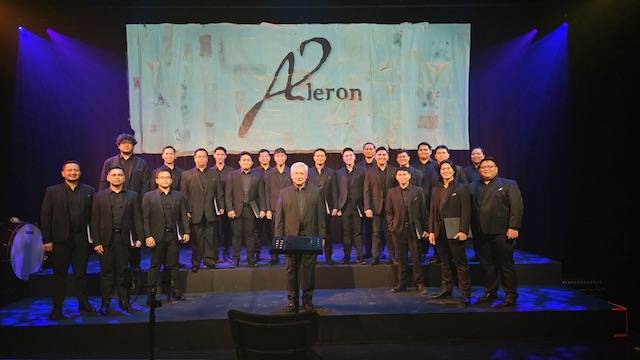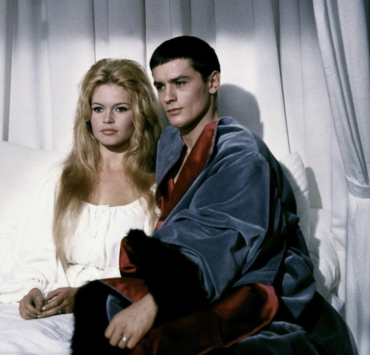Aleron enchants anew with powerful performance

Aleron, an all-male choir that has pioneered in countertenor singing, brought the house down in its all-seats-taken concert held on Aug. 3 at the Doreen Block Box Theater, Arête on the Ateneo campus in Quezon City. The phenomenon was a repeat of its concert last year that eloquently attested to Aleron’s choral might, acquired since its founding in 2006.
Dubbed “To Where I Wait,” the English translation of St. John of the Cross’ “A questa me guiaba,” the concert, said guest conductor and professor Joel Navarro in his notes, “gives voice to human experience.”
Such a theme underscores Aleron’s thrust of exploring “concept concerts” that the choir has pursued quite recently to communicate ideas on life and its meaning, expressed through choral literature worldwide. This has resulted in the appreciation of enriched new choral works from abroad that had hitherto not been heard on the local stage.
A parallel story had been incorporated into the concert, scripted by veteran playwright/director Pat Valera. With such theatrical eloquence, the audience’s appreciation of the songs rendered was greatly enhanced, as the dialogue ran parallel to the themes the songs underscored.
Engaging
The story unfolded in the fraternal story of the brothers Ben and David, respectively, essayed brilliantly by Esteban Mara and Iggi Siasoco. Ben mourns the death of his brother David, but hopes for the “final reward,” of reuniting with his lost brother through a return to the “Old Belief,” a hope that in time would bring solace to one’s suffering.

As Navarro correctly affirmed: “Our music is the soundtrack to Pat’s script, while his script is the storyline to our music.”
With the crafty handling of intelligent lighting designed by D Cortezano, the concert became a total choral-theatrical experience that focused on “grief, death, longing, friendship and belief,” as Navarro said in his notes.
Divided into two parts, the concert showcased Aleron’s choral prowess. In the first part, the group made use of the countertenor voice as it sang as a mixed choir, essaying works by the Estonian composer Cyrillus Creek such as “Taaveti Laulud: Onnis on inimin,” “Taaveti lau 141” and Taaveti laulud 22”; English composer Hubert Parry, with his “Songs of Farewell: My Soul, there is a Country”; and American composer Jeffrey Van, through his “A Procession Winding Around Me,” a choral setting of Walt Whitman’s poems on the ghastly civil war.
The singing was engaging. The opening song, “Onnis on inimine,” was a moving invocation. Religious fervor was felt even more in the other works of Creek, which ended part 1 of the program. Known for integrating folk element into church modes, Creek produced work that exuded a singular religious allure, seen in works including Psalms 141 and 22. Sensitively, Aleron expressed the religious fervor of the work. Indeed, to paraphrase St. Augustine, singing is praying twice.
War songs
A stark contrast was provided by the two war songs that followed: first “My soul, There is a Country” and the more extended “A Procession Winding Around Me,” that consisted of four numbers, featuring a guitar collaboration. Here the ghastly theme of inhumanity that war brings is fully commented on and expressed succinctly in the phrase, “An enemy as divine as oneself is butchered to death!”
Guitarist Iqui Vinculado gave utmost collaborative support. Eloquently, she played not only the strings of the guitar but also its body and headstock to produce the desired sound. She was in close rapport with Navarro, whose hands gave precise cues.
On the podium, Navarro waved his hands with dynamic authority. Both hands were actively engaged: The right defined the beat, and the left eloquently gave out cues. Under his authoritative command, both choir and guitarist were led into a dynamic fusion that engaged full, appreciative listening. No wonder Navarro is a very much sought-after imam on choral conducting. It has always been a delight to be on the jury for the recitals of his doctoral students, which count both Filipinos and foreigners, at the St. Paul University–Manila College of Music, where he is a professor in choral conducting.
It was in the second part that Aleron unveiled another feather on its hat: that of a virile all-male choir that is sorely missed on the local stage nowadays. This was eloquently displayed in the auspicious opening number, a powerful rendition of Veljo Tormis’ “Litany to Thunder,” a choral setting of an ancient ritual for rains to end the drought, a symbol of humankind’s desperation in “times of abandonment and great need,” as Navarro’s notes said. Here, tenor Karl San Jose and baritone Richard Moreno took turns in intoning their solo passages.
Singing with conviction
To give that vivid onomatopoetic imitation of the natural sound of the thunder, a chorister, Kevin Maske, provided a collaborative role as a drummer, playing with vigorous zest.
Another highlight of the full men’s voices was heard in Grieg’s songs for the male choir, where six songs were sung. These songs, like the rousing opening number, were highlighted with soloists from the choir itself. Here, one noted further the soloist caliber of the choir, from the bass, baritone and tenor sections. They sung with conviction and fully disclosed the ardor of their God-given vocal prowess.
The soloists were Jose Mari Gutierrez (baritone) in “Springdans, No. 6”; Lanselle Xaris Nantes (bass) in “Agonizing Tilt, No. 4”; Kevin Maske and Lean Victor Lucas, tenors and Lanselle Xaris Nantes, bass, in “Children’s Songs No. 2”; Jed Angelo Marcelo, baritone, in “The Gypsy Lad” No. 9 and “I Lay Down so Late” No. 1, and again, Maske, tenor, in “It is the Greatest Folly, No. 5.”
In the last three songs, Aleron reverted into a mixed choir, in Kreek’s “Psalm 121.” National Artist for Music Ryan Cayabyab’s setting of “A questa me guiaba” was also given a fresh, debonair arrangement by Aleron’s Karl San Jose. This was capped by Parry’s moving “There is an old Belief,” where the slower portion toward the end soared to a great height, bringing home the theme of Ben’s quest for a lost soulmate, David, his brother, who died. Powerfully, the song proclaimed: “No matter how eternal is the sleep, dear friends shall meet again.”
Thunderous applause greeted the cast at the end. The literate audience counted, among others, Dr. Ramon Santos, National Artist for Music; Norway Ambassador Christian Halas Lester and his wife Catherine Lester; and Dr. Milagros Ong-How, a philanthropist, patroness of the arts, and Aleron’s staunchest and longest supporter.

















